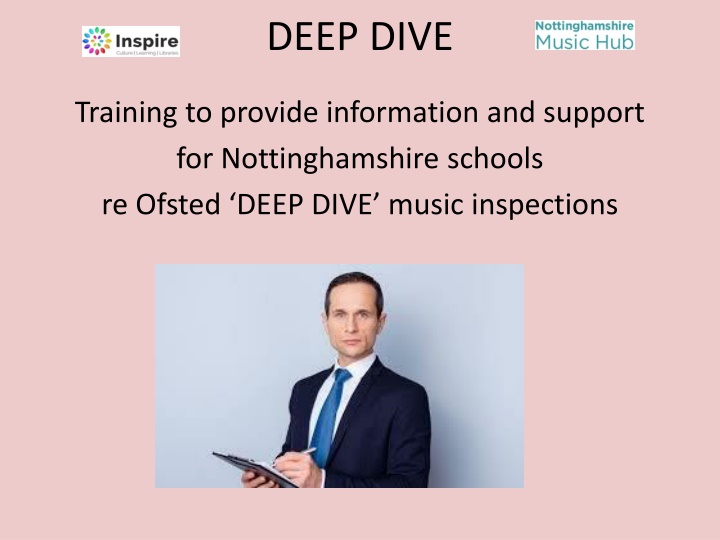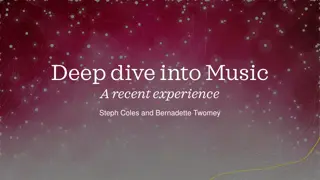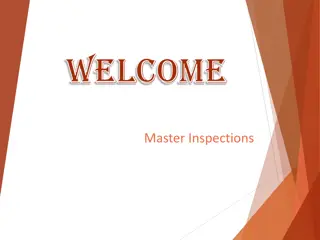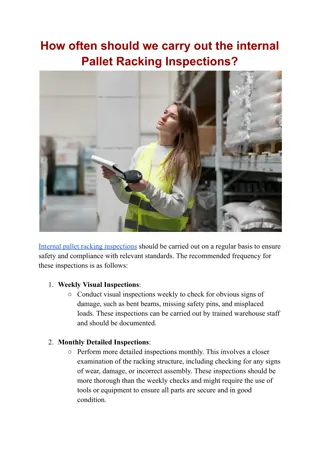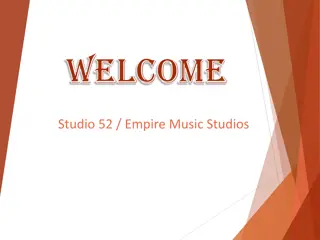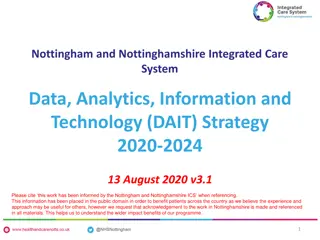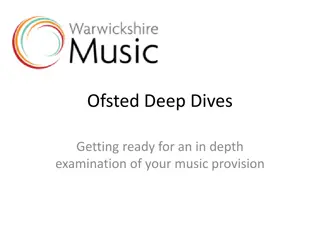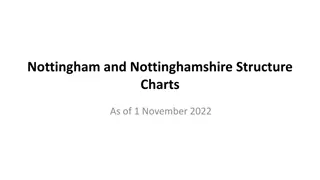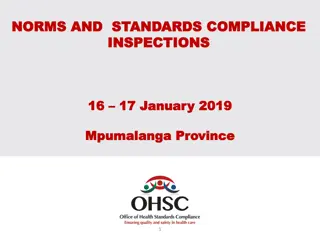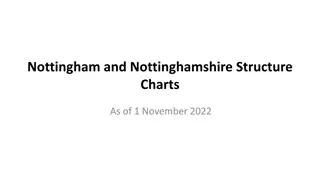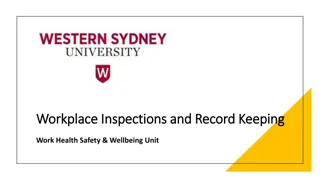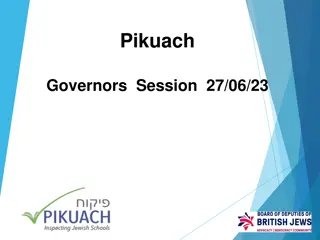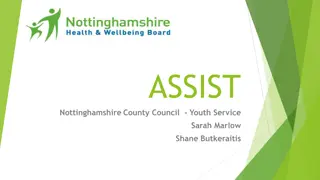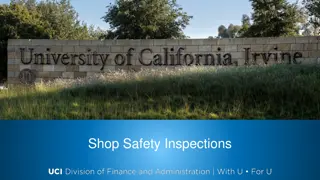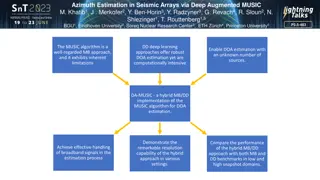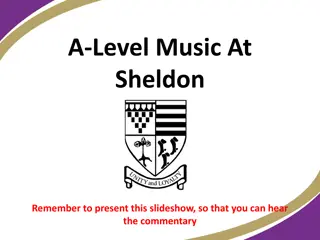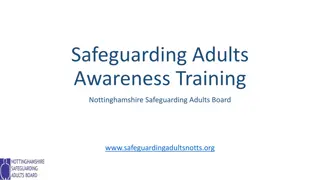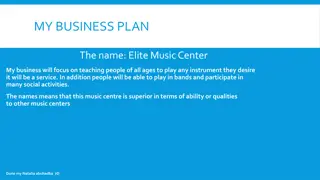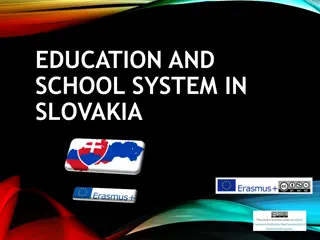Deep Dive Training for Nottinghamshire Schools on Music Inspections
Providing support and information for Nottinghamshire schools undergoing Ofsted Deep Dive music inspections. Subject leaders express challenges through a humorous anthem, highlighting the complexities of managing music education. The content references specific experiences and activities, such as starting a recorder group, selecting choir songs, and dealing with the pressures of inspection. Inspectors generally seek evidence of meeting National Curriculum Programme of Study goals. Examples of inspection criteria can be found on the Nottinghamshire Music Education Hub website.
Download Presentation

Please find below an Image/Link to download the presentation.
The content on the website is provided AS IS for your information and personal use only. It may not be sold, licensed, or shared on other websites without obtaining consent from the author.If you encounter any issues during the download, it is possible that the publisher has removed the file from their server.
You are allowed to download the files provided on this website for personal or commercial use, subject to the condition that they are used lawfully. All files are the property of their respective owners.
The content on the website is provided AS IS for your information and personal use only. It may not be sold, licensed, or shared on other websites without obtaining consent from the author.
E N D
Presentation Transcript
DEEP DIVE Training to provide information and support for Nottinghamshire schools re Ofsted DEEP DIVE music inspections
MUSIC SUBJECT LEADERS ANTHEM (Tune: John Brown s Body/Little Peter Rabbit) I m a subject leader and I haven t got a clue! Music is the subject and there s such a lot to do My predecessor left because the job was such a strain She s in therapy again! Chorus: Why am I the subject leader? Why am I the subject leader? Why am I the subject leader? I can t read music or keep in time!
Started a recorder group: were playing A and B, Haven t chosen songs for choir, we re practising at three! Must find a show with parts for every child in Key Stage 2 And Ofsted s overdue! Chorus: Why am I the subject leader? Why am I the subject leader? Why am I the subject leader? I can t spell Bartok or conduct the band!
Im a subject leader and its driving me insane! Someone s pinched the hymn book And that parent s here again! The scheme of work is useless And the peri s always late And Ofsted s here at eight! Chorus: Why am I the subject leader? Why am I the subject leader? Why am I the subject leader? I can t sing for toffee and I m always flat!
Abandoned the recorder group: we couldnt manage E Locked the hall piano and I cannot find the key. I must produce an action plan - assessments for Class 4 And Ofsted s at the door! Chorus: Why am I the subject leader? Why am I the subject leader? Why am I the subject leader? It s not the job for me!
Evidence so far .. Evidence from primary DD inspections What were inspectors asking/looking for? Examples available on the Nottinghamshire Music Education Hub website
1.Training to support Deep Dive inspections NATIONAL CURRICULUM PROGRAMME OF STUDY Aims: to ensure that all pupils: perform, listen to, review and evaluate music across a range of historical periods, genres, styles and traditions, including the works of the great composers and musicians. learn to sing and to use their voices to create and compose music on their own and with others have the opportunity to learn a musical instrument use technology appropriately have the opportunity to progress to the next level of musical excellence. understand and explore how music is created, produced and communicated, including through the inter-related dimensions: pitch, duration, dynamics, tempo, timbre, texture and appropriate musical notations.
2.Training to support Deep Dive inspections NATIONAL CURRICULUM PROGRAMME OF STUDY Key stage 1: Pupils should be taught to: use voices expressively and creatively by singing songs & speaking chants & rhymes play tuned and untuned instruments musically listen with concentration & understanding to a range of high-quality live & recorded music experiment with, create, select and combine sounds using the inter-related dimensions of music. Key stage 2 : Pupils should be taught to sing and play musically with increasing confidence and control. They should develop an understanding of musical composition, organising and manipulating ideas within musical structures and reproducing sounds from aural memory. Pupils should be taught to: play and perform in solo and ensemble contexts, using their voices and playing musical instruments with increasing accuracy, fluency, control and expression improvise and compose music for a range of purposes using the inter-related dimensions of music listen with attention to detail and recall sounds with increasing aural memory use and understand staff and other musical notations appreciate and understand a wide range of high-quality live and recorded music drawn from different traditions and from great composers and musicians develop an understanding of the history of music
3.Training to support Deep Dive inspections What is the recommended length and frequency of music lessons in primary schools? Most educators share the opinion that lessons should be taught weekly for: KS1: 30 minutes KS2: 45- 60 minutes Carousel arrangements are not ideal for music
4.Training to support Deep Dive inspections Is the school s music scheme fit for purpose? Charanga/ Music Express cover all NC requirements Music Express: Collins have developed new skills documents available at https://collins.co.uk/pages/primary-music- music-express-skills-progression-and-curriculum-mapping Curriculum maps for each year group (1-6) Summary of skills for each year group (1-6) Table of skills progression across the year groups 2-year rolling programme for mixed-age classes FREE scheme MUSIC MADE SIMPLE available on the website *** Check that the music content offered in other curriculum frameworks fully covers NC requirements
5.Training to support Deep Dive inspections Are teachers, TAs or other musicians teaching in schools, adequately skilled and confident to deliver music lessons? Training offers: CPD courses and annual music conference Charanga training is available Music Express training is available from Collins (naomi.cook@harpercollins.co.uk) CME (Certificate for Music Educators: Trinity or ABRSM) is a recognised national qualification available at centres nationwide e.g. MEHEM and a Fast-Track Primary CME programme at the University of Northampton
6.Training to support Deep Dive inspections Is long, medium and short term planning in place? Charanga and Music Express both provide detailed planning at each level *** Check other curriculum frameworks for adequate music planning
7.Training to support Deep Dive inspections Is there a year-on-year Action Plan with clear success criteria? Music Action Plan formats will vary from school to school but they should set out achievable aims that reflect practitioners and pupils needs and support the development of music across the school. (Action Plan example available on the website)
8.Training to support Deep Dive inspections Does the school follow a clear progression route for music, citing skills, knowledge and experience that all pupils will acquire on their musical journey ? Nottinghamshire Progression Pathways (on the website) offers a progression map for EYFS KS5 Charanga & Music Express provide progressive and age-appropriate musical content in all units of work. *** Check that other curriculum frameworks provide musical progression
9.Training to support Deep Dive inspections Is EYFS music delivered through best holistic practice? Does EYFS outdoor provision offer an enabling environment appropriate to young learners musical exploration? Music in EYFS settings should be happening every day in informal, child-initiated as well as teacher-led approaches. Useful document EYFS Musical Development Matters https://www.early-education.org.uk/musical-development- matters-download
10.Training to support Deep Dive inspections How is the quality of music provision monitored? Planning to be submitted to subject leader plus short iPad video clips uploaded to class folders on the school server. Ideally drop-in lesson observations for curriculum and WCIT whole class instrumental teaching, led by subject leader perhaps joined by SLT. Consider inviting the school governor responsible for music to attend? Ofsted document: Music in Schools, promoting good practice aimed Heads, Governors re observing lessons
11.Training to support Deep Dive inspections How are SEND, EAL etc. pupils needs accommodated in music lessons? Printed lesson plans annotated to show how pupils with specific needs are accommodated. If not possible for every lesson, then for each unit (an example is found on the website)
12.Training to support Deep Dive inspections How is delivery differentiated in mixed age classes? Charanga provides Gold, Silver, Bronze differentiated tasks Music Express: same unit titles for adjacent year groups skills analysis documents 2-year rolling programme for mixed age groups https://collins.co.uk/pages/primary-music-music- express-skills-progression-and-curriculum-mapping
13.Training to support Deep Dive inspections Is percussion provision adequate and stored appropriately? Is technology readily accessible e.g. iPads Percussion trolleys are often placed in awkward spaces/cupboards with instruments crammed on inaccessible shelves. Better to divide up percussion between Y1/2, 3/4, 5/6 and keep in large plastic boxes in classrooms with a chart of instrument contents with photos & names. Check that sufficient tuned percussion is available. Six sets of chime bars sold in plastic cases are cheaper than one wooden xylophone ( 179)
14.Training to support Deep Dive inspections Do classes sing every day/week? Are there opportunities for each KS to sing together? Is repertoire appropriate does it demonstrate progression? Encourage staff to sing with pupils every day: singing underpins well- being, releases endorphins & promotes listening& social interaction. Impossible to cover appropriate repertoire/progression for Reception- Y6 in whole school singing assemblies; consider separate Key Stage singing led fortnightly. Sing Up - over 750 songs; a menu for different age groups, topics, musical styles etc; recordings, backing/echo tracks, teaching notes and song-based units of work. Music Express and Charanga also have Song Banks A vocal progression document from Minimum Expected Standards is available on the website A staff choir is a wonderful endorsement of the value of singing!!!
15.Training to support Deep Dive inspections Is technology threaded appropriately through music delivery? Explore apps that connect technology to practical live music-making; reduce whiteboard-centric musical activity e.g. Chris Smith (Apple) (c.smith@krcs.co.uk) leads workshops. soundOscope Toca band Drop dots Launchpad Garageband
16.Training to support Deep Dive inspections Are pupils engaged in regular and creative music-making do they identify as musicians and composers ? Generalist teachers are often uncomfortable with the composing/improvising component of NC music. Pupils should be given regular opportunities to create their own music, beginning with exploration at EYFS and developing towards greater competence through experimentation and knowledge of the interrelated dimensions. Compositions should incorporate voices, percussion, WCIT instruments and technology. Music Express/Charanga offer ample scope for creative outcomes but opportunities for pupils music-making should not be bypassed! A document showing progression of the NC composing strand is found on the website.
17.Training to support Deep Dive inspections Which classes have WCIT? How is progress monitored? Is there dialogue between tutor and attending adult/subject leader? A useful dialogue document is available on the website for Y3,4,5 and 6, offering an overview of achievement after each unit.
18.Training to support Deep Dive inspections How is WCIT incorporated into the life of the school? e.g. assembly performances, showcase opportunities. Is there continuation after participation? Maximise exposure of pupils instrumental playing more than just the end of term showcase . Take video clips, photographs and keep a record of in-school performances. Encourage pupils who show aptitude or whose well- being needs are being addressed by additional tuition, to continue.
19.Training to support Deep Dive inspections 1: Is there any additional instrumental tuition for individual pupils/small groups? Funded by parents, covered by the school/ PP? How are players integrated into the musical life of the school? 2: Be aware of and keep a record of pupils who learn instruments privately outside school or who sing in community/faith choirs/groups? Use the dialogue documents (slide 17) to record achievements of those in additional tuition groups and make efforts to include these players, AND those who acquire musical skills independently outside school, in in- school performances.
20.Training to support Deep Dive inspections Which music activities go beyond National Curriculum requirements i.e. enrichment? Are these organised by the Hub or private enterprise e.g. Projects with Arts organisations Live music events provided by the Hub Combined school festivals or cluster events In-house performances/shows to parents Hub/Music Service recital team visits Emphasis on genuine legacy, not one-off tokenistic experiences.
21.Training to support Deep Dive inspections How do you instil a love of music and acquaintance with a broad range of music? Carefully selected listening music e.g. music played in assemblies, with appropriate background information to provide context, via a PowerPoint slide bearing an image, featured instruments, any relevant elements . (NC: listen to music from historical periods, genres, styles and traditions, including the works of the great composers and musicians; an understanding of the history of music) BBC Ten Pieces ABRSM Classical 100
21a.Training to support Deep Dive inspections This week s assembly music Ah! Vous dirai-je, Maman by Mozart There are 12 variations based on Twinkle Twinkle played on a harpsichord. Each new piece has extra twiddly bits!
22.Training to support Deep Dive inspections What are the lunchtime or out-of-hours music activities offered at your school? Are they truly inclusive? i.e. do members come from identified groups e.g. SEND, Pupil Premium, FSM, EAL boys etc. Maintain and check registers of attending pupils and be proactive and creative in organising clubs and activities that appeal to hard-to-reach pupils. Some may be unable to attend after school so lunchtime may be a better option.
23.Training to support Deep Dive inspections Which Hub events are regularly attended? How are links with Hub maintained? Be informed of events and maintain links using the Hub social media platforms e.g. Facebook / Twitter
24.Training to support Deep Dive inspections Do performances form a regular part of school life? Performances are crucial because they . Make a statement that music is important in school life Create an ambassadorial function; make schools more visible Forge valuable links with community and parents Increase pupils self confidence, self-assurance and well-being Provides important social contact Adds to your school s cultural capital
25.Training to support Deep Dive inspections How does music feature in cross-curricular or topic- based planning? Is it age-appropriate, does it maintains progression of skills, knowledge and understanding? The danger of incorporating random cross-curricular material occurs when content is inappropriately matched to pupils musical experience: Minimum Expected Standards document can provide a check-list of age-appropriate content Music Express scheme is topic-based
26.Training to support Deep Dive inspections How do key skills and knowledge contribute to the acquisition of cultural capital (preparing pupils to take advantage of opportunities in future life) particularly for pupils from disadvantaged backgrounds? Cultural capital will be assured if, alongside other strong arts provision, your school offers rich, varied, high quality creative musical experiences for pupils. Consider also ArtsMark and Arts Award
27.Training to support Deep Dive inspections How is pupil progress measured, monitored and recorded in practical and manageable ways? Do older pupils self-assess showing independent development of musical skills and competences? e.g. polar graphs? Formal music assessment in primary music should be as hands off and as light touch as possible. Keith Swanwick Commercial schemes offer assessment formats The website has a flexible three-tier assessment framework document based with space to record teachers brief personalised comments. Class folders on school servers for uploading footage of music-making e.g. at the beginning and end of each unit Include any tangible evidence e.g. graphic scores, screen-grabs
28.Training to support Deep Dive inspections Polar self-assessment graph pupils and teachers co-select musical criteria for the 8 segments and colour in to match perceived competence 0 = poor; 10 = perfection!!!
29.Training to support Deep Dive inspections What should be kept in music subject leader s file? Suggested headings the fine detail is available on the website Section 1: OVERVIEW: MUSIC YEAR ON YEAR Section 2: MUSIC IN THE MEDIUM TERM Section 3: AUDITS AND QUESTIONNAIRES -links to action plans Section 4: DAY-TO-DAY IMPLEMENTATION Section 5: PUPILS MUSIC MAKING Section 6: CPD and TRAINING Section 7: CELEBRATION OF MUSIC Section 8: APPENDIX e.g. reports from HMI, Ofsted etc.
30.Training to support Deep Dive inspections Final thoughts and support routes offered by the Hub www.inspireculture.org.uk/nottinghamshire-music-hub/ Social Media: Facebook; Twitter; Instagram Inspire Music Awards Arts Award templates and support Progression Pathways from EYFS-KS5 Launch of new membership packages from Sept 2020 School consultation visits CPD training in house Singing strategy and Singing Hub School network with free resources (physical and online) Subsidised Charanga subscription and Charanga training Free Music Mark schools membership (including free resource bank)
